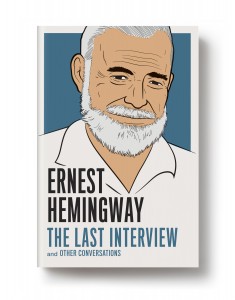December 16, 2015
Excerpt: Ernest Hemingway’s Last Interview
by Melville House
 An extraordinary collection of pugnacious, charming, and revealing interviews with the Nobel Prize-winning author who defined and transformed American literature.
An extraordinary collection of pugnacious, charming, and revealing interviews with the Nobel Prize-winning author who defined and transformed American literature.
Ernest Hemingway was not only known for his understated style, but for his public image as America’s greatest author and journalist—and for the grand, expansive, adventurous way he lived his life. The prickly wit and fierce dedication to his craft that defined Hemingway’s life and work shine through in this unprecedented collection of interviews.
Below, an excerpt from his May 1954 interview with George Plimpton, founding editor of The Paris Review.
THE ART OF FICTION, NO. 21
Interview by George Plimpton
INTERVIEWER: Are the hours during the actual process of writing pleasurable?
HEMINGWAY: Very.
INTERVIEWER: Could you say something of this process? When do you work? Do you keep a strict schedule?
HEMINGWAY: When I am working on a book or a story I write every morning as soon after first light as possible. There is no one to disturb you and is it is cool and you come to your work and warm as you write. You read what you have writ- ten and, as you always stop when you know what is going to happen next, you go on from there. You write until you come to a place where you still have your juice and know what will happen next and you stop and try to live through until the next day when you hit again. You have started at six in the morning, say, and you may go on until noon or be through before that. When you stop you are as empty, and at the same time never empty but filling, as when you have made love to someone you love. Nothing can hurt you, nothing can hap- pen, nothing means anything until the next day when you do it again. It is the wait until the next day that is hard to get through.
INTERVIEWER: Can you dismiss from your mind whatever project you’re on when you’re away from the typewriter?
HEMINGWAY: Of course. But it takes discipline to do it and this discipline is acquired. It has to be.
INTERVIEWER: Do you do any rewriting as you read up to the place you left off the day before? Or does that come later, when the whole is finished?
HEMINGWAY: I always rewrite each day up to the point where I stopped. When it is all finished, naturally you go over it. You get another chance to correct and rewrite when someone else types it, and you see it clean in type. The last chance is in the proofs. You’re grateful for these different chances.
INTERVIEWER: How much rewriting do you do?
HEMINGWAY: It depends. I rewrote the ending to Farewell to Arms, the last page of it, thirty-nine times before I was satisfied.
INTERVIEWER: Was there some technical problem there? What was it that stumped you?
HEMINGWAY: Getting the words right.
INTERVIEWER: Is it the rereading that gets the “juice” up?
HEMINGWAY: Rereading places you at the point where it has to go on, knowing it is as good as you can get it up to there. There is always juice somewhere.
INTERVIEWER: But are there times when the inspiration isn’t there at all?
HEMINGWAY: Naturally. But if you stopped when you knew what would happen next, you can go on. As long as you can start, you are all right. The juice will come.
INTERVIEWER: Thornton Wilder speaks of mnemonic devices that get the writer going on his day’s work. He says you once told him you sharpen twenty pencils.
HEMINGWAY: I don’t think I ever owned twenty pencils at one time. Wearing down seven number-two pencils is a good day’s work.
INTERVIEWER: Where are some of the places you have found most advantageous to work? The Ambos Mundos hotel must have been one, judging from the number of books you did there. Or do surroundings have little effect on the work?
HEMINGWAY: The Ambos Mundos in Havana was a very good place to work in. This Finca is a splendid place, or was. But I have worked well everywhere. I mean I have been able to work as well as I can under varied circumstances. The tele- phone and visitors are the work destroyers.
INTERVIEWER: Is emotional stability necessary to write well? You once told me you could only write well when you were in love. Could you expound on that a bit more?
HEMINGWAY: What a question. But full marks for trying. You can write any time people will leave you alone and not interrupt you. Or rather you can if you will be ruthless enough about it. But the best writing is certainly when you are in love. If it is all the same to you I would rather not expound on that.
INTERVIEWER: How about financial security? Can that be a detriment to good writing?
HEMINGWAY: If it came early enough and you loved life as much as you loved your work it would take much character to resist the temptations. Once writing has become your major vice and greatest pleasure only death can stop it. Financial security then is a great help as it keeps you from worrying. Worry destroys the ability to write. Ill health is bad in the ratio that it produces worry which attacks your subconscious and destroys your nerves.
INTERVIEWER: Can you recall an exact moment when you decided to become a writer?
HEMINGWAY: No, I always wanted to be a writer.
ERNEST HEMINGWAY: THE LAST INTERVIEW
ISBN: 9781612195223
PAGES: 112
FORMAT: PAPERBACK
On Sale Now!